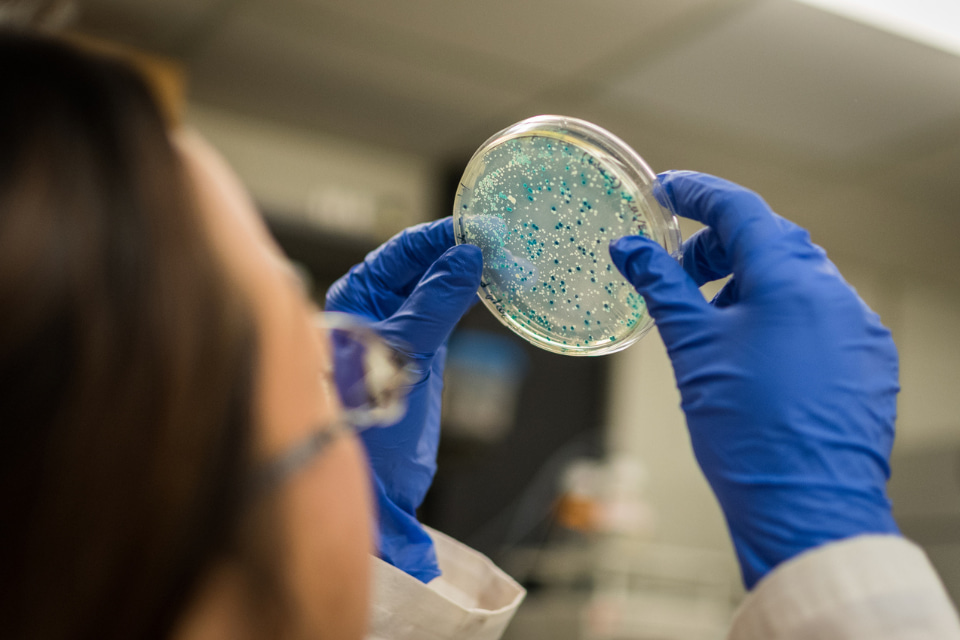New Microbiome Innovation Network to drive UK bioscience research and impact

Researchers from the University of Liverpool’s Microbiome Innovation Centre are part of a UK-wide consortium that have been awarded £644,000 to establish the Microbiome Innovation Network (Microbiome-Net). It is designed to strengthen microbiome research and drive its application to some of the world’s most pressing health and environmental challenges.
Funded by a BBSRC Network Grant, Microbiome-Net brings together teams from the University of Liverpool, the National Biofilms Innovation Centre, the Quadram Institute, Nottingham Trent University, and the University of Oxford. This three-year programme will be co-directed by Professor Jo Fothergill, Director of the Microbiome Innovation Centre and Professor Jo Slater-Jefferies, CEO at the National Biofilms Innovation Centre.
Microbiome science is unlocking transformative solutions for global challenges, from health and antimicrobial resistance to food security and climate change. Microbiomes are the unique communities of microorganisms in our bodies and environments, influencing everything from human wellbeing to agricultural productivity. The UK stands at the forefront of innovation, with sectors such as healthcare, nutrition, personal care, and agriculture poised to benefit. Global markets for microbial bioproducts, such as probiotics and agricultural biologicals, are booming, valued at $71 billion and $16 billion respectively. Yet, progress can be slowed by fragmented research and limited collaboration between academia and industry. Bridging these gaps is key to unleashing the full potential of microbiome innovation.
To address these challenges and take advantage of opportunities offered, Microbiome-Net will contribute to BBSRC's strategic priorities in agriculture and food security, industrial biotechnology and bioscience for health by fostering collaboration, innovation, and translational research across these domains. By enhancing visibility, accessibility, and connectivity among a wide range of stakeholders, nationally and internationally, this network will help the UK to be at the forefront of microbiome research and innovation and accelerate the pace of innovation and research.
Microbiome-Net will build on the legacy of the former Innovate UK Microbiome Knowledge Transfer Network by creating a 'network of networks' that unites researchers, innovators, and institutions across the UK. Its goal is to strengthen capacity, support innovation, and foster a more connected and collaborative national microbiome innovation ecosystem.
Professor Fothergill said: "Microbiome science holds enormous potential to help solve some of the world’s most urgent challenges - from antimicrobial resistance and food security to climate change and human health. However, the translation of microbiome research in the UK is often held back by fragmented approaches and a lack of coordination. Microbiome-Net will tackle these barriers head-on. Through a strong industry voice, high-quality training programmes, public engagement activities, and a dynamic events series, we aim to accelerate learning, build stronger consortia, and position the UK as a global leader in microbiome innovation."
Professor Slater-Jefferies said: "Microbiome-Net represents a pivotal step forward in uniting the UK’s microbiome research and innovation landscape. Biofilms and microbiomes are strongly linked. By fostering collaboration across disciplines and sectors, we can accelerate the translation of microbial science into real-world solutions that address global challenges. At NBIC, we’ve seen first-hand how coordinated efforts can unlock transformative impact, and I’m excited to co-direct this initiative to help shape a more connected, resilient, and innovative microbiome ecosystem that benefits from NBIC’s work in the Biofilms sector."
Dr Amanda Collis, Executive Director for Research Strategy and Programmes at BBSRC, said: "Microbiome research is a vital and rapidly evolving field with far-reaching implications for human health, agriculture and environmental sustainability. BBSRC is proud to support the launch of Microbiome-Net, which will foster a more joined-up, inclusive and dynamic innovation landscape across the UK. By uniting academic excellence with industrial insight, this new network will play a key role in accelerating translation, strengthening interdisciplinary collaboration and ensuring the UK remains at the forefront of global microbiome research and innovation."
Get involved
Microbiome-Net will launch at the Microbiome Innovation One Health Conference in Oxford from 15-16 September 2025. Researchers and other stakeholders within academia, industry and the public sector are invited to get involved. To sign up to our mailing list or share your ideas for the network, please complete this short expression of interest or contact the team directly using the email addresses below.